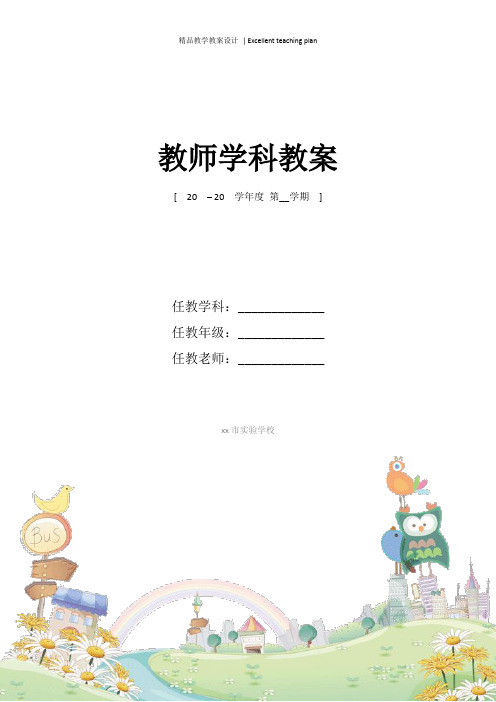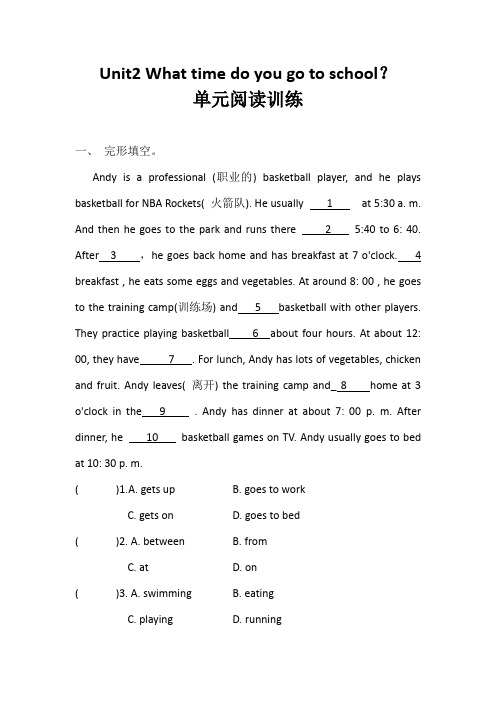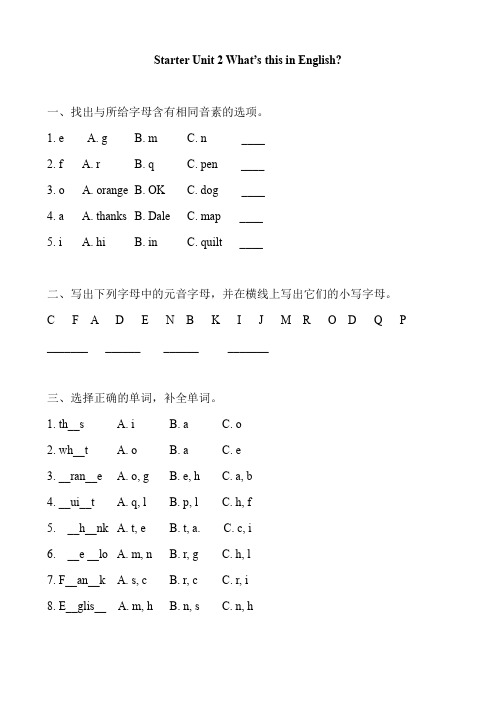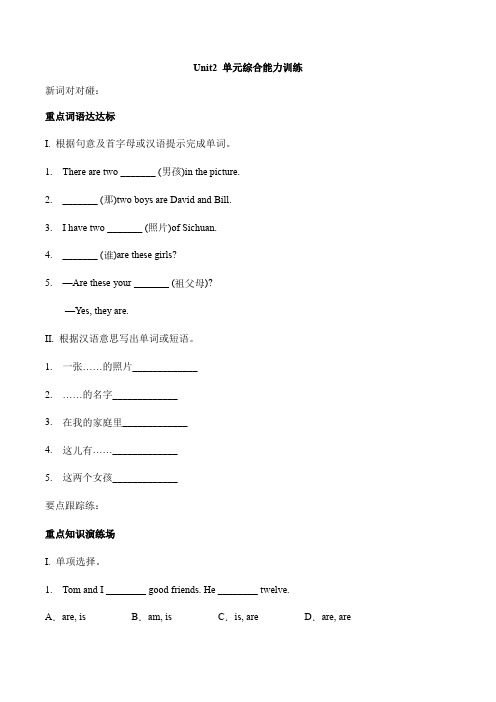训练单 U7T2
U7T2SB教学设计新部编版

(3)提高听说读写的交际能力实践创新能力。
(4)会用英语谈论自己和他人能或不能做的事情。
过程与方法:自主、合作、探究的学习方式,主要的课堂活动形式有角色表演,谜语抢答,讨论,歌唱等
情感态度与价值观:提高学习英语的兴趣,养成良好的学习习惯、热爱大自然、以诚待人、不说谎话的优良品德。
教学重点及解决措施
教师学科教案
[20 – 20学年度第__学期]
任教学科:_____________
任教年级:_____________
任教老师:_____________
xx市实验学校
仁爱英语七年级(下册)
Unit7 Topic 2 Can you dance or draw?
Section B教学设计
学科初中英语授课年级七年级学校李僧固初中教师姓名刘文梅
2.Pair work .Go on talking about more animals:fish,cat,monkey frog,…
【设计说明】二人一组互助学习及热烈的讨论,特别是多媒体动画的播放增加了直观性和趣味性,使学生的学习兴趣更浓,发散了他们的思维。
Step6Practice
1.Finish 3(P64).Let the stusents listen to the tape carefully andnumber the picturesin order,then check the answers together.
1.Work in groups.Finish 4.Let the students talk about one of their friends using the expressions in the box.They may also use their own words:
人教新目标七年级英语下册 Unit2 单元阅读训练 含答案

Unit2 What time do you go to school?单元阅读训练一、完形填空。
Andy is a professional (职业的) basketball player, and he plays basketball for NBA Rockets( 火箭队). He usually 1 at 5:30 a. m. And then he goes to the park and runs there 2 5:40 to 6: 40. After 3 ,he goes back home and has breakfast at 7 o'clock. 4 breakfast , he eats some eggs and vegetables. At around 8: 00 , he goes to the training camp(训练场) and 5 basketball with other players. They practice playing basketball 6 about four hours. At about 12: 00, they have 7 . For lunch, Andy has lots of vegetables, chicken and fruit. Andy leaves( 离开) the training camp and_ 8 home at 3 o'clock in the 9 . Andy has dinner at about 7: 00 p. m. After dinner, he 10 basketball games on TV. Andy usually goes to bed at 10: 30 p. m.( )1.A. gets up B. goes to workC. gets onD. goes to bed( )2. A. between B. fromC. atD. on( )3. A. swimming B. eatingC. playingD. running( )4.A. With B. ForC. InD. Over( )5. A. playing B. playsC.to playD. play( )6.A. for B. inC. atD. on( )7. A. breakfast B. lunchC. dinnerD. supper( )8.A. goes B. comeC. goes toD. comes to()9.A.morning B. afternoonC. eveningD. night( )10. A. watches B. looksC. seesD. reads二、阅读理解。
Unit2词汇拓展与单选练习人教版英语七年级下册

Unit 2 What time do you go to school?1.up [ʌp] adv. 向上●反义词down adv.向下2.get up 起床;站起3.dress [dres] v.穿衣服(第三人称单数dresses)n.连衣裙(复数dresses)●get dressed 穿上衣服●dress up (as)/dress oneself打扮●dress in/ be dressed in穿着…●dressing table梳妆台4.brush [brʌʃ] v.刷刷净(第三人称单数brushes)n.刷子(复数brushes)5.tooth [tuːθ] n. (复数teeth[tiːθ])牙齿6.shower ['ʃaʊə] n. & v. 淋浴n.淋浴器(间);小雨●take/have a shower 洗淋浴ually ['ju:ʒuəli] adv.通常地;一般地(反义词usual adj.经常的)●usual adj.通常的(反义词unusual adj.不经常的)8.forty ['fɔ:(r)ti] num.四十9.wow [waʊ] interj.(表示惊奇或敬佩)哇;呀10.never ['nevə(r)] adv.从不;绝不●形似词ever adv.曾经11.early ['ɜːlɪ] adv. & adj.早(的)●late adv.&adj. 晚(的)12.fifty ['fɪftɪ] num.五十13.job [dʒɒb], [dʒɑːb] n.工作;职业(可数名词)14.work [wɜːk] v. & n. 工作(不可数名词)v.起作用●worker n.工人●work as…作为…(职业)15.station ['steɪʃn] n.电(视)台;车站●radio station 广播电台●bus station/stop公交车站●railway/train station 公交车站●stationary adj.固定的stationery n.文具16.o'clock [ə'klɒk], [ə'klɑ:k] adv.(表示整点)…点钟●clock n.钟17.night [naɪt] n. 晚上;夜晚●at night 在晚上●midnight n.半夜at midnight 在半夜18.funny ['fʌnɪ] adj.奇怪的;滑稽好笑的●fun n.乐趣have fun玩的开心19.exercise ['eksəsaɪz] v. & n. 锻炼;练习●do morning exercise做早操20.on weekends (在)周末=on the weekend21.best [best] adj.最好的adv.最好地;最22.group [gruːp] n.组;群● a group of一群23.half [hɑːf], [hæf] n. & pron. 一半;半数(复数halves)●half of… …的一半24.past [pɑːst],[pæst] prep.晚于;过(时间)adj.过去的●to prep.欠(时间)25.quarter ['kwɔː(r)tə(r)] n.一刻钟;四分之一26.homework['həʊmwɜː(r)k] n. 家庭作业(不可数名词)●do (one’s) homework 做作业●housework n.家务活27.run [rʌn] v. 跑;奔(ran, run, running)●runner n.跑步运动员28.clean [kliːn] v.打扫;弄干净adj.干净的●cleaner n.清洁工29.walk [wɔːk] n. & v. 行走;步行take a walk 散步;走一走●walker n.步行者,散步者30.quickly ['kwɪkli] adv. 很快地(反义词slowly adv.慢地)●quick adj.快速的(反义词slow adj.慢的)31.either ['aɪðə(r)], [ 'iː ðə(r) ]adv.或者;也(用在否定词组后)●either…or…要么……要么……;或者……或者……●neither adv.两者都不neither…nor既不…也不…32.lot [lɒt], [lɑ:t] pron.大量;许多●lots of 大量;许多=a lot of33.sometimes ['sʌmtaɪmz] adv.有时●sometime 来日,改天●some times好几次,好几倍●some time一段时间34.taste [teɪst] v.有……的味道;品尝n.味道;滋味(后接形容词)●感官动词:smell, sound, feel, look35.life [laɪf] n.生活;生命(复数lives)一、单项选择。
国外足球u7训练教案

国外足球u7训练教案教案标题:国外足球U7训练教案教案目标:1. 帮助U7年龄段的孩子们建立对足球的兴趣和热爱。
2. 培养孩子们的基本足球技能,如传球、射门和控球。
3. 提高孩子们的协作能力和团队意识。
教案内容:1. 热身活动:- 让孩子们进行简单的跑动和拉伸活动,以准备身体。
- 进行一些趣味性的热身游戏,如“红绿灯”或“跳绳比赛”,以增强孩子们的反应能力和协调性。
2. 基本技能训练:- 传球:教授正确的传球姿势和技巧,如用内脚背传球。
让孩子们进行简单的传球练习,例如两人之间的来回传球。
- 射门:介绍正确的射门姿势和技巧,如用内脚背射门。
设置几个小球门,让孩子们轮流进行射门练习。
- 控球:教授如何用脚内侧控制足球,并进行简单的控球练习,如在指定区域内进行传接球练习。
3. 小游戏:- 进行一些小游戏,如“抢球游戏”或“进攻防守游戏”,以提高孩子们的协作能力和团队意识。
- 确保游戏规则简单明了,让孩子们能够理解和参与。
4. 结束活动:- 进行一些放松活动,如静态伸展或冥想,以帮助孩子们放松身心。
教案评估:1. 观察孩子们在训练中的参与度和积极性。
2. 观察孩子们在基本技能训练中的表现,如传球的准确性、射门的力量和控球的稳定性。
3. 观察孩子们在小游戏中的团队合作和沟通能力。
教案扩展:1. 鼓励孩子们参加足球俱乐部或校队,以进一步提高他们的技能和比赛经验。
2. 组织定期的比赛或友谊赛,让孩子们有机会展示他们的技能和团队合作。
教案注意事项:1. 确保训练场地安全,并提供适当的足球装备。
2. 确保训练内容适应U7年龄段的孩子们的认知和发展水平。
3. 鼓励孩子们积极参与,不过分强调比赛结果,注重技能的学习和团队合作的培养。
希望这份教案能够为您提供专业的指导和建议,帮助您在国外足球U7训练中取得良好的效果。
人教版英语七年级上册 Starter Unit 2 What’s this in English? 单元复习训练 含答案

Starter Unit 2 What’s this in English?一、找出与所给字母含有相同音素的选项。
1. e A. g B. m C. n ____2. f A. r B. q C. pen ____3. o A. orange B. OK C. dog ____4. a A. thanks B. Dale C. map ____5. i A. hi B. in C. quilt ____二、写出下列字母中的元音字母,并在横线上写出它们的小写字母。
C F ADE N B K I J M R O D Q P _______ ______ ______ _______三、选择正确的单词,补全单词。
1. th__s A. i B. a C. o2. wh__t A. o B. a C. e3. __ran__e A. o, g B. e, h C. a, b4. __ui__t A. q, l B. p, l C. h, f5. __h__nk A. t, e B. t, a. C. c, i6. __e __lo A. m, n B. r, g C. h, l7. F__an__k A. s, c B. r, c C. r, i8. E__glis__ A. m, h B. n, s C. n, h四、找出不同类单词.1. A. quilt B. jacket C. orange D. T-shirt2. A. Alice B. Cindy C. Eric D. English3. A. key B. evening C. afternoon D. morning4. A. map B. apple C. orange D. egg5. A. hello B. pen C. ruler D. pencil6. A. what B. how C. who D. spell7. A. bag B. pen C. bed D. orange五、单项选择1. This is ______ orange.A. aB. anC. /2. That is ______ map.A. aB. anC. /3. — What’s this?— _______ “I”.A. It’sB. This isC. Its4. “千克”的英文缩写是_______。
Unit 2 This is my sister.单元综合能力训练 人教版英语七年级上册(有答案)

Unit2 单元综合能力训练新词对对碰:重点词语达达标I. 根据句意及首字母或汉语提示完成单词。
1.There are two _______ (男孩)in the picture.2._______ (那)two boys are David and Bill.3.I have two _______ (照片)of Sichuan.4._______ (谁)are these girls?5.—Are these your _______ (祖父母)?—Yes, they are.II. 根据汉语意思写出单词或短语。
1.一张……的照片_____________2.……的名字_____________3.在我的家庭里_____________4.这儿有……_____________5.这两个女孩_____________要点跟踪练:重点知识演练场I. 单项选择。
1.Tom and I ________ good friends. He ________ twelve.A.are, is B.am, is C.is, are D.are, are2.—What's that_______English?—It's _______ eraser.A.at; a B.for; an C.in; an D.in; a 3._____ is Tom. _____bag is at home(在家).A.She; Her B.Her; She C.His; He D.He; His 4.Is ________ your brother?A.the boy B.a boyC.the girl D.a girl5.__________ my books. They are new.A.Here are B.Here is C.This is D.That is II. 从(II)中选择合适的句子补全(I)对话,其中有两项多余。
U7---U8训练大纲
小学一二年级足球训练大纲1:U7-----U8年龄段队员的脑功能发育处于飞跃发展的阶段,大脑神经活动的兴奋性水平很高,表现为爱说爱动,注意力一般只维持20---30分钟左右,形象思维任然占主导,逻辑思维很不发达,很难理解抽象的概念;独立性和自觉性比较差,在生活和学习游戏活动等各个方面都需要成人监护和具体指导,几乎无条件地信任老师。
该年龄段的队员不具备很强的理解能力,但是可以接受和理解一些简单的技战术讲解;开始可以与同伴合作,偶尔会寻找队友并有意思地为其传球,但仍然不知道如火如荼融入整体战术中。
因此在学习和训练中,需要引导队员去体验足球是一项集体运动的本质特点,在训练中设置自发无限制的游戏活动,使他们寻找足球游戏的乐趣。
在训练中教练员应该多使用鼓励性语言积极引导队员参与到游戏中来。
该年龄段是队员灵敏素质发展的敏感期,可以采用不同灵敏素质联系方法发展队员的灵敏素质及反应能力。
2:U7----U8年龄段的训练主要让队员双脚对球有一定的地面控制能力,随着年龄的增长让队员单脚或者双脚有一定的控颠球能力。
这个年龄段的队员有与队友合作的初步意愿和意识并且队员有主动观察的表现,初步具备进攻和防守的基本知识运用能力。
3:U7----U8年龄段训练(1)以脚步及下肢主要部位进行多种形式的控颠球练习(2)以脚背外侧、脚背内侧脚背正面、脚内侧为主、脚掌拖拉为辅进行运控球基本练习(3)原地、较慢运动状态下逐步过渡到快速运动状态下的脚步、大腿、胸部控球基本练习,包括地滚球、反弹球和空中球(4)多种部位如:脚内侧、脚背正面、脚内侧、脚背外侧的传球、射门基本技术训练(5)正面、侧面抢球时的基本身体站位姿势和抢球方法。
该年龄段是灵敏素质的敏感期,应注重综合发展灵敏素质速度素质及提高柔韧性应以各种灵敏性的跑、跳跃、跨越练习和游戏比赛为主,可以运用多种辅助训练器材,进行提高反应、平衡、协调和节奏感的身体动作练习同时也要发展裸关节的灵活性和柔韧性训练。
牛津译林版7上Unit 2 Let’s play sports! Reading 1 提优训练(含答案)
牛津译林版7上Unit 2 Let’s play sports!Reading 1 提优训练I.小小翻译家1.我最喜爱的足球明星2.Huanghe Football Club3.看起来强壮4.足球踢得很好5.在他的空余时间里Ⅱ.根据中文提示或用所给词的适当形式填空1. Zhou Suhong is a good football (明星).2. There are many (俱乐部) in our school.3. Selina is a (成员) of S. H. E.4. My son likes (swim) very much.5. To play football in Huanghe Football Team is my (梦想).Ⅲ.睁开慧眼,精挑细选1.--Do you like Tom?--The ? Yes! He is good at football.A. singerB. playerC. dancerD. member2. his free time,Liu Hua enjoys listening to music.A. AtB. OnC. InD. Of3. Li Hua is member in Huanghe Football Team.A. newB. a oldC. oldD. a new4. To play in the is every football player's dream.A. Olympic GamesB. World CupC. football matchD. football team5. --We have a new Maths teacher.-- ? Who?A. OKB. RightC. ReallyD. No6. --Do you like ? --No,I don't like any water sports.A. gamesB. swimmingC. footballD. volleyball7. --What's your favourite , Tom?--I like playing football.A. fruitB. sportC. hobbyD. shopping8. --Do you enjoy with your classmates on the Internet?A. to talkingB. talkC. talkingD. to talk9. The girl has to do today.A. lots of homeworkB. a lot of homeworksC. a lot homeworkD. lots of homeworks10. They at school.A. have lunchB. have a lunchC. have a breakfastD. have the breakfastⅣ.句型转换1. Liu Hua is my favorite football player.(改为同义句)2. He comes from Guangdong. (改为同义句)3. He plays basketball very well. (改为否定句)4. He studies English. (改为否定句)5. It makes him happy. (改为一般疑问句)Ⅴ.小小翻译家1.我们希望他的梦想能变成现实。
Unit-7-Letter-to-a-B-Student答案综合教程二
Unit 7 Letter to a B StudentKey to the ExercisesText comprehensionI.B.II.1. T;2. T;3. T;4. F;5.F.III.1.Paragraph2. It is our society, which overemphasizes winning, considers failure a sin, and sees prosperity in the present as a sure sign of salvation in the future.2.Paragraph 4. Because the students may have acquired more or less knowledge out of the course than the grade indicates.3.Paragraph 5. His attitude is critical. He complains the exclusion of such important characteristics as courage,kindness,wisdom and good humor.4.Paragraph 8. It was to make a clear distinction between the student as classroom performer and the student as human being. So a low grade, at best, indicates an incompetent classroom performer,not an incompetent human being.5.Paragraph 9. He thinks social labels, including grades, are basically irrelevant and misleading, though necessary. But it’s not self-contradictory because social labels are necessary as ways of distinction for job choice, not as reasons for attitude toward others or ourselves in human terms.IV.1.Being unsuccessful and disadvantaged is regarded as sinful because in this word people tend to think today’s success can save one from evil in the future.2.It is important to see the fact that although they differ in their class status and educational background, human beings are essentially the same. Biologically they are constructed in the same way, and they share the common feelings of fear and joy and the common experience of suffering and achieving. This commonality has bound them together. All of them will regard wars, diseases, and disasters both private and public as unfortunate big events in their life time.Vocabulary AnalysisI. Phrase practice1.essence: inner nature; indispensable quality; the most important part 本质,实质,精髓2.deadly sins: sins leading to damnation. (pride, covetousness, lust, anger, gluttony, envy and sloth,in Christianity)3.misleading:making you think or act wrongly 误导,误入歧途4.conventional task:task traditionally required of students传统任务5. in short supply:far from enough供给不足,缺乏II.1. define;2.irrelevant;3. correspond to;4.flunked;5. rather;6.makes a point of;7. apt to;8. go round.III.Word derivation.Fill in the blanks with the appropriate forms of the given words.1. removal2.climatic3. salvation4. proficiency5. assumption6.normally7. resentment8. disastrousIV.1. B;2.D;3.C;4.C;5. B;6. D;7. B;8.D.V.Synonym/AntonymGive a synonym or an antonym of the word underlined in each sentence in the sense it is used.1.Synonym:balanced,compensated2.Antonym:unconventional3.Antonym:abundant,plentiful4.Synonym:evaluated,assessed5.Synonym:average6.Synonym:essentially,basically7.Antonym:lightly,frivolously8.Antonym:temporarilyVI.PrefixWrite in each space one word that has the same prefix as underlined in each given word.1. interfere international2.transcend translate3.circumstances circumference4.neocolonial neoclassical5.control conform6.antibiotic antisocial7.unlock undo8.outnumber outshineGrammar ExercisesI. Rewrite the following sentences using proper disjuncts.1.Unfortunately,…2.Hopefully, …3.Oddly enough,…4.Rightly,…5.Luckily,…6.Fortunately,…7.Strangely enough,…II.1.It was right that…/They were right to have….2.It was foolish that … / It was foolish of the boy not to say … / The boy was foolish not to say ….3.type 1.4.type 2.5.type 2.6.type 2.7.type 2: It was lucky that….8.type 2: It is hoped that….III. Fill in each blank with a proper relative word. Use “preposition + relative word”if necessary.1.which / that;when;by which,2.on which3.that4.for whom5.with whom6.to whom7.of which8.at whichIV.1.where, where2.what, which3.what4.why5.where6.When7.why8.which,which,whatV.whatever,wherever,whoever,whichever, whenever, and howeverComplete the following sentences with the appropriate words in the box.1.However2.Whatever3.whatever4.Wherever5.whichever6.whoever7.However8.whenever/wheneverTranslation exercisesI.1.不管我们的标准是什么,这个标准现在提高了,结果使你对自己没能得到更高的分数而感到失望。
译林版(2024)七年级上册Unit 2 Hobbies 基础练习(含答案)
24秋译林版七上U2 基础题练习一、请根据句意及中文或首字母提示写出句中所缺单词。
1. There are many flowers and trees _________ (围绕) the lake in the park.2. My cousin is too fat. He needs to c his eating habits (习惯) to s (保持) healthy.3. Sandy likes keeping diaries (日记) to help herself remember (记住) all k of ________ (事情).4. You can find answers to questions about when, where and how l began in _________ (博物馆).5. There’s something wrong with the toy car and it doesn’t work. Can you take it a andf it?1. My grandma ________ up early in the morning. She ________ doing breakfast by 7 o’clock.2. The little baby ________ every night and her mother ________ a lot about her.3. Linda with her parents usually ________ kites in the park at the weekend.4. The weather here __________ quickly. It’s better if he ________ an umbrella with him.5. Tony’s dad often ________ how a car works in his free time. He sometimes ________ the car himself when it can’t start.三、单项选择1. “What’s that?” is one of the first ________ that children say.A. hobbiesB. thingsC. subjectsD. matches2.The teacher showed us some small things and asked us ________ and learn how they work.A. take apart themB. take them apartC. to take it apartD. to take them apart3.It’s great fun for him ______ see all kinds of ______ things in the science museum.A. get to; interestingB. to get to; interestingC. get to, interestedD. to get to; interested4.—________?—He thinks science is very cool.A. How does Daniel show his love for scienceB. What does Daniel do at science museumsC. Why does Daniel love science so muchD. What does Daniel like to do for science5.My brother gets ________ Xiangyu’s hometown in Suqian this time.A. visitingB. to visitC. to visitingD. visit6.I keep writing in English about my everyday (每日的) ________ and I learn to use English better ________.A. look; on this wayB. luck; in this wayC. life; this wayD. answer; on that way7.—What does Daniel use the internet to do?—He uses it _______ answers ______ his science problems.A. find; forB. look for; ofC. to find; toD. look for; to8.—________ does he visit the homeless (无家可归的) children?—Twice a week. He’s good ________ children. He helps them to read and tells them stories.A. How often; atB. How many; forC. How much; toD. How often; with四、请用括号内所给词的适当形式填空, 补全对话。
- 1、下载文档前请自行甄别文档内容的完整性,平台不提供额外的编辑、内容补充、找答案等附加服务。
- 2、"仅部分预览"的文档,不可在线预览部分如存在完整性等问题,可反馈申请退款(可完整预览的文档不适用该条件!)。
- 3、如文档侵犯您的权益,请联系客服反馈,我们会尽快为您处理(人工客服工作时间:9:00-18:30)。
.
..
八年级英语(学科)问题训练单
Subject Review Unit 7 Topic 2 Designer
杨青勇
Name Class Date
Ⅰ. 单项选择。
( )1. It’s very kind ____ you to help me with my English.
A. for B. with C. of D. to
( )2. —Could I have ____ bottle of apple juice, please?
—Of course. Here you are.
A. another B. other C. the other D. others
( )3. Please ____ the ham and green onions finely, then add them to
the bread. A. cut up B. cut into C. cut in D. cut off
( )4. Don’t worry. My father will ____ us up in the car if it rains
tomorrow. A. bring B. take C. carry D. pick
( )5. I remembered ____ off the light last night, but it was still on.
A. turning B. to turn C. turned D. turn
( )6. I don’t know ____ it’s polite or not to eat with our arms or
elbows on the table in America.
A. if B. whether C. weather D. which
( )7. In old days, people often used animals ____ in the fields.
A. to working B. for working C. to work D. work
( )8. Somebody ____ begging for(讨要) money near the bridge last
week. A. is B. was C. are D. were
( )9. It’s impolite ____ laugh at others in our country.
A. to B. for C. onto D. with
( )10. —I want to know if Bob ____ us in the discussion tonight.
—I believe if he ____ his homework, he will join us.
A. will join; will finish B. will join; finishes
C. joins; finishes D. joins; will finish
(巩固提高部分)
句型转换。
1. Would you mind opening the door?(改为同义句)
Would you mind ____ ____ open the door?
2. My favorite food is dumplings. (对画线部分提问)
____ ____ ____ favorite food?
3. I wanted to know ...
How did you make sandwiches?(合并为含宾语从句的句子)
___________________________________________________________
4. These courses aren’t the same as those ones. (改为同义句)
These courses are ____ ____ those ones.
.
..
5. You’d better cook chicken soup tonight. (改为否定句)
You’d ____ ____ cook chicken soup tonight.
(拓展训练部分)
Ⅲ. 书面表达。
你的美国笔友想学做一道中国菜,这有一个食谱,试着向你的朋友介绍
一下做法,词数在40—50之间。
原料:豆芽(bean sprouts),盐。
步骤:首先把锅放在火上。然后在锅里倒一些油。油热了之后,放入豆
芽、盐。翻炒(stir fry)一两分钟。最后将豆芽盛入盘子里。
